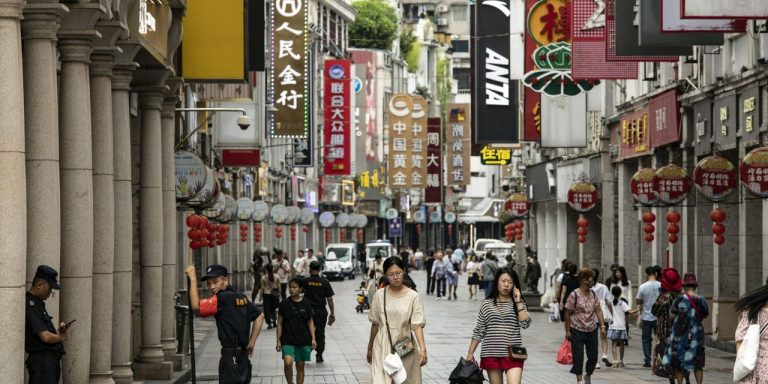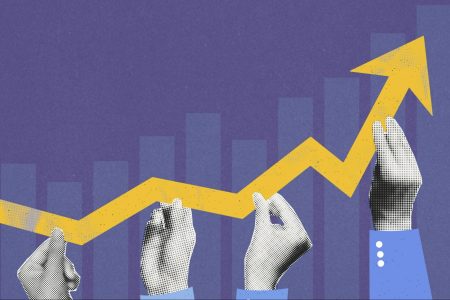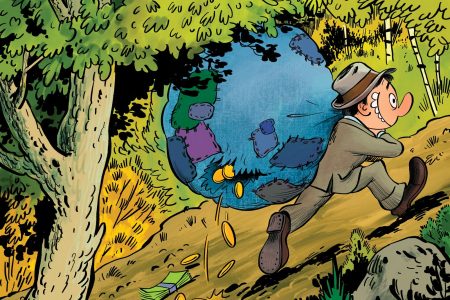Pedestrians pass stores in Guangzhou, China, on Friday, Aug. 11, 2023. China’s economy is sputtering, with troubling implications for the rest of the world, write Indermit Gill and M. Ayhan Kose.
Qilai Shen/Bloomberg
About the authors: Indermit Gill is the World Bank’s chief economist and senior vice president. M. Ayhan Kose is the Bank’s deputy chief economist and director of the Prospects Group.
A collective sigh of relief is going up in some of the wealthiest economies. They have proved to be remarkably resilient in the face of the steepest rise in interest rates in decades. In the U.S., inflation has been whittled down, so far without much harm to growth or employment. Growth in some developing economies, including India and a few others in East Asia, has also been strong.
Don’t break out the champagne yet. The near-term risk of global recession may have receded, but the world economy remains fragile. Even in the economies showing resilience, the recent upbeat mood could vanish as the slow-acting effects of high interest rates sink in. A toxic trio remains firmly in place, threatening the global economy: elevated debt levels, tighter financial conditions, and weaker growth prospects. For many developing economies, these are often the ingredients of a financial crisis.
Total global debt today is stuck at historic highs, roughly two-and-a-half times the world’s total economic output. At the end of 2022, the debt-to-gross domestic product ratio for developing economies other than China was 126%, up about 30 percentage points since 2010. As interest rates have surged, government budgets have been squeezed. Many developing economies now spend more on debt-service payments than they do on health and education.
This financial squeeze shows no sign of abating. Global interest rates may be approaching their peak, but they aren’t likely to decline much in the near term. In many advanced economies, headline inflation has cooled, but core inflation—which excludes food and energy—has remained stubbornly high. That suggests major central banks will remain inclined to keep up the fight against inflation by maintaining high interest rates, as Federal Reserve Chair Jerome Powell acknowledged at the meeting of central bankers in Jackson Hole last week. Global financial markets are finally beginning to adjust to the reality of “higher-for-longer” interest rates.
Many developing countries have seen a steep increase in financing costs. For one-fifth of these economies, sovereign spreads—the difference in yields on bonds issued by these economies relative to U.S. bonds—now exceed ten percentage points, indicating a prohibitively high cost of borrowing. Not surprisingly, sovereign debt defaults by developing countries have surged. In the last four years alone, there have been 15 such defaults, compared with 19 in the previous two decades.
Amid these strains, global growth is slowing, and the doldrums could persist for a while. Global growth is expected to average just 2.3% this year and next—nearly a full percentage point below the prepandemic average. The latest consensus forecasts (see figure) suggest that growth in more than 85% of countries will be slower this year than last year. This broad-based slowdown should not be a surprise. Among the three major engines of the global economy, only the U.S. is delivering robust growth today. In the euro area, growth has been stalling. China’s economy is sputtering, with troubling implications for the rest of the world. Excluding China, growth in developing economies is set to slow substantially—from 4.1% last year to 2.9% this year.
The implications are bleak. By the end of next year, people in nearly 30% of developing economies will remain poorer than they were before the Covid-19 pandemic. The usual propellants of growth—trade and investment—are dwindling. Global trade growth is forecast to slow sharply this year—to less than 2% from 6% in 2022. Investment growth in developing economies this year and next is expected to average a tepid 4.2%, well below the 7.1% average in the first two decades of this century.
Persistently weak growth will make it harder for governments to tackle the array of challenges that beset their citizens. Extreme weather events have already become more frequent, with greater attendant economic damage, even in the wealthiest countries. Food insecurity is on the rise, and climate change is making it worse. At the end of 2022, 2.4 billion people—nearly a third of humanity—lacked year-round access to enough safe and nutritious food.
Bolstering growth under these conditions won’t be easy. But it can be done, provided that national and global policy makers resist the lure of shortcuts and stay focused on policy interventions that improve medium- to long-term growth. Since fiscal resources have been largely depleted and inflation is still elevated, now is not the time to think about large-scale economic stimulus packages.
Structural policies can help reduce overall uncertainty while building confidence. A central pillar of these policies must be to boost investment to meet development and climate goals. This can be done by improving public-spending efficiency, reallocating resources toward priority infrastructure projects, improving governance frameworks and business climates, and streamlining the regulatory environment. Global cooperation will be essential to accelerate the clean-energy transition, mitigate climate change, and provide debt relief for the rising number of countries facing debt distress.
The recent resilience of a few economies is welcome, but it won’t defuse the threats confronting the global economy. Policy makers need to stay focused on the hard work that lies ahead. They must complete the unfinished task of taming inflation. They must push forward with the comprehensive policy reforms that will be needed to achieve sustainable long-term growth and prosperity.
Guest commentaries like this one are written by authors outside the Barron’s and MarketWatch newsroom. They reflect the perspective and opinions of the authors. Submit commentary proposals and other feedback to [email protected].
Read the full article here









